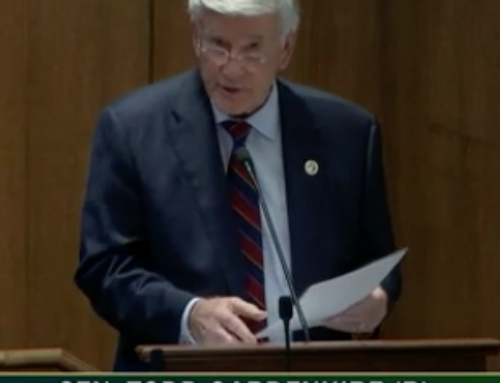Should reporters censor information from government proceedings? Of course not

Davidson County District Attorney Glenn Funk (right) is suing NewsChannel 5 reporter Phil Williams (left), saying Williams’ reporting damaged his reputation. The case is headed to the Tennessee Supreme Court in a test over the state’s fair report privilege.
The Tennessee Supreme Court is set to hear oral arguments on Oct. 4 in an important case involving state libel laws and a free press.
The appeal before the state’s highest court is a test of the state’s fair report privilege.
On a practical level, this privilege, which is recognized in every state’s laws, protects journalists from libel claims when they are reporting on official proceedings — such as court cases and city council meetings — as long as the reporting is a fair, accurate and balanced account of what happened.
If someone sues for libel, a court can dismiss the case at an early stage under the fair report privilege applying those standards.
Phil Williams reported story relying on court documents
In a libel case filed in February 2016, Davidson County District Attorney Glenn Funk claims that two stories by NewsChannel 5’s chief investigative reporter Phil Williams injured his reputation.
Williams relied on court documents for his reporting. But the question before the Tennessee Supreme Court is not whether Williams accurately and fairly reported on those documents.
The question before the high court is whether a fair report privilege that could protect Williams from liability can be overcome if Funk can show Williams was motivated by animosity.
In other words, if the Supreme Court adopts Funk’s argument, and if Funk can show Williams acted with spite or ill will toward him, it would not matter if the stories were a fair, accurate and balanced account of what was in court documents.
Under such a scenario, the lawsuit could be allowed to continue with Funk forcing the news station and Williams to produce notes and information about how they went about the story so Funk could sort through it for evidence.
Public officials can “win” a libel suit even if they lose
Most public officials who sue for libel do not win. This is because of the Supreme Court’s ruling in 1964 that established that the only way a public official could win is that if a reporter knew a story was false or behaved in reckless disregard of the facts. This is called “actual malice.”
But this higher standard has not stopped public officials from filing libel lawsuits.
Many public official plaintiffs can “win” even if they ultimately lose their case. By subjecting journalists and news organizations to grueling, drawn-out litigation, they’ve achieved their goal: to punish the speaker.
Fair report reduces liability for reporters covering government proceedings
The fair report doctrine is important. It protects a free press by immediately reducing liability risk for accurate news reports of official government proceedings and documents.
“Suppose a witness says the vilest, most untrue, most defamatory things possible in a court of law,” says First Amendment attorney Lucian Pera of Memphis. “Then a reporter ought to be able to repeat them verbatim, to inform the public about what’s going on in court, without regard to malice and without regard to their truth or falsity, with no repercussions. That’s fair report.”
With diligence and professionalism, a journalist can meet the standards of accuracy, fairness and balance in a news story, even when covering contentious issues.
Yet Funk argues in his brief filed with the state’s highest court that this is not enough and suggests motivation of the reporter could be more important:
“The question for this Court is, should defamation law leave injured parties without a remedy as long as what the press published is a fair and accurate summation of a proceeding — even if what is published is false or politically motivated? No matter how lascivious? Or, in this age of ‘fake news’ and increasingly politically motivated news stories, should there be a safeguard built into the fair report privilege?”
Reporters should be the eyes and ears of the public
I can’t help but worry of the Pandora’s box of litigation against journalists that would pour forth if everyone who did not like how they were portrayed in a story about a court case or a city council meeting could open a court-sanctioned interrogation into the state of mind and personal opinions of the news reporter who wrote it.
Are reporters supposed to choose against reporting things from official government proceedings that might make someone look bad? Act as censors of government proceedings instead of the eyes and ears of the public?
Reporters in Tennessee shouldn’t have to risk expensive and time-consuming litigation and a raid on their notes for just doing their job.
Such an unreasonable and unworkable threat would result in fewer journalists willing to fully report on public affairs, and the public would be worse off for it.
Note: A group of several news media organizations filed an amicus brief, written by First Amendment attorney Paul McAdoo. It has many excellent arguments and outlines fair report privilege. Here’s an excerpt from his conclusion, pointing out the First Amendment problems with Funk’s arguments:
Permitting a showing of express malice to overcome a fair report privilege treats speakers differently based solely upon their intent and motivation. If a partisan political pundit publishes truthful information about a political opponent based on government records or proceedings for the purpose of harming the political opponent, that could be sufficient to defeat the fair report privilege. But a reporter with no axe to grind against the politician who publishes the same information could successfully rely upon the fair report privilege. This is not only illogical, it is also unconstitutional.
Also, read the brief filed attorney Ron Harris for Scripps Media and Phil Williams.





